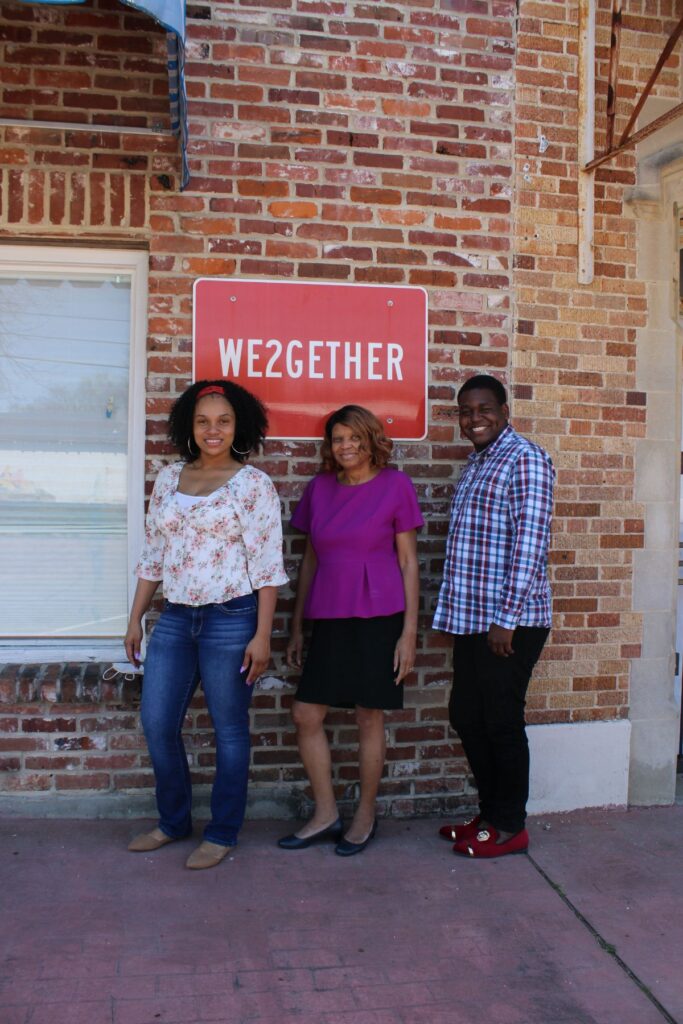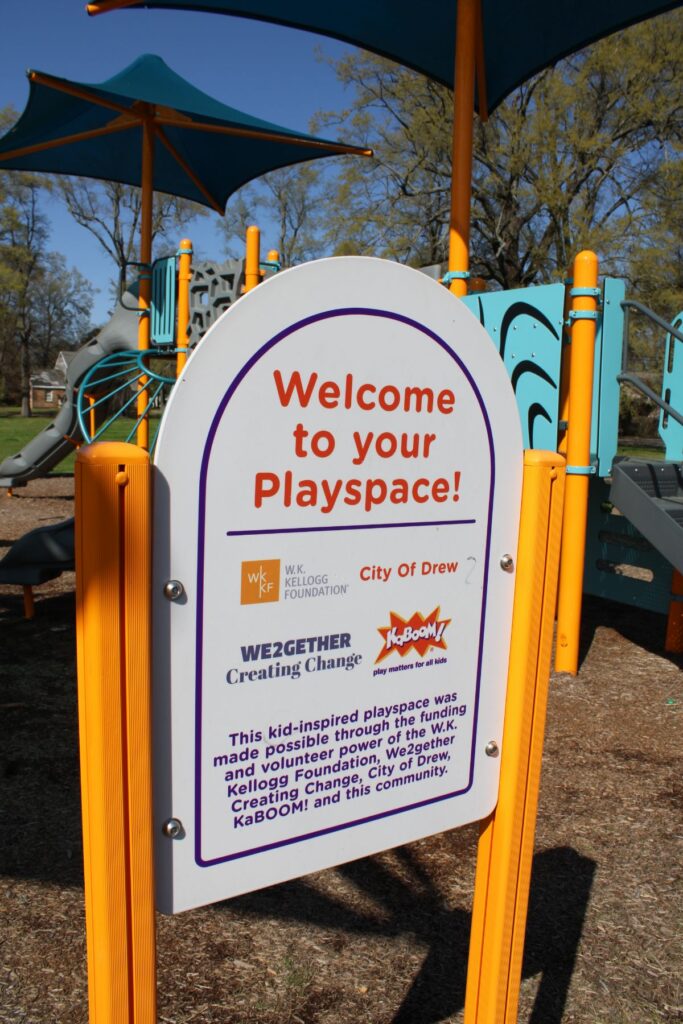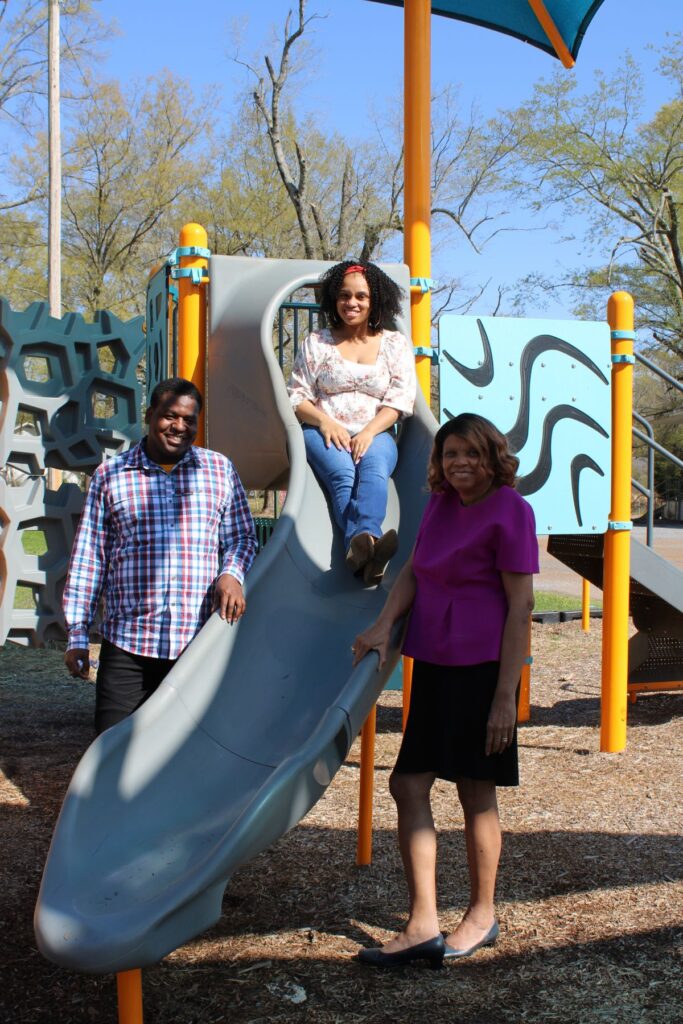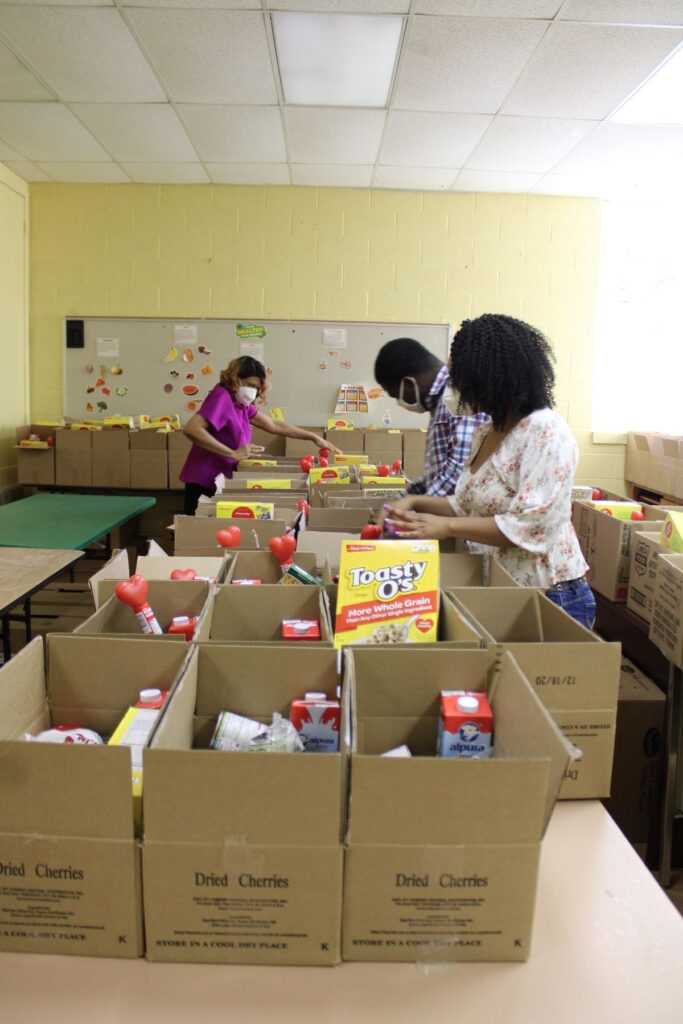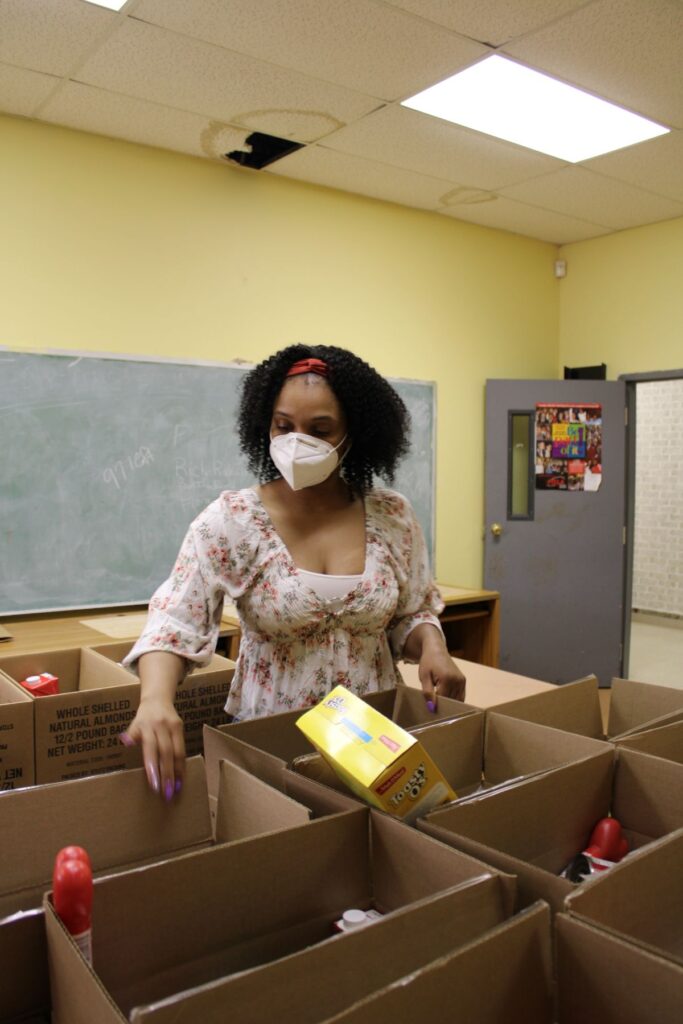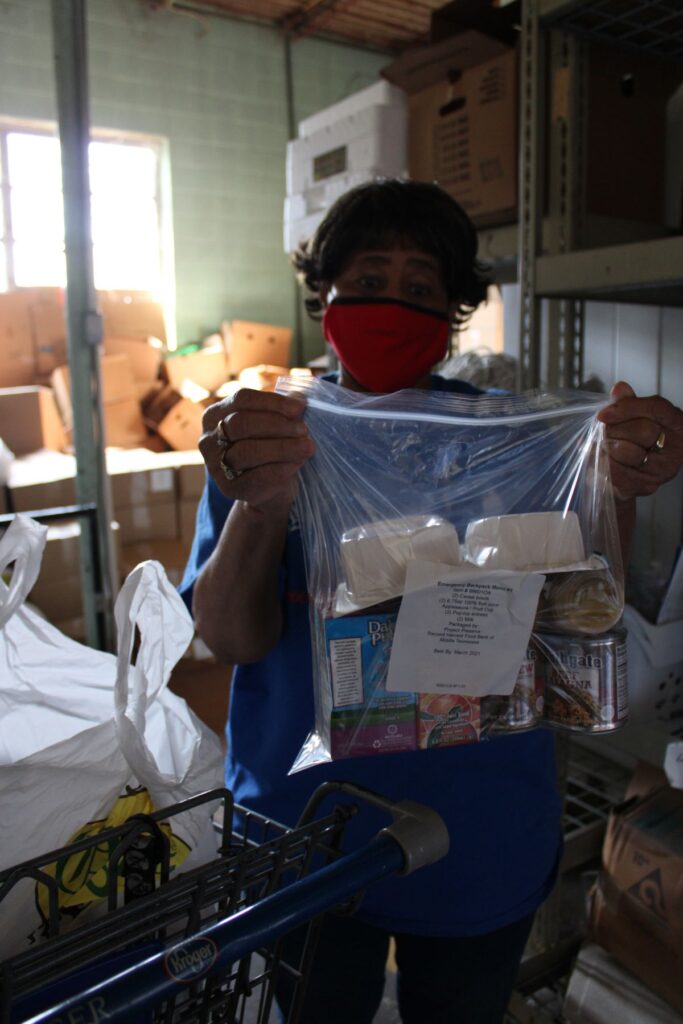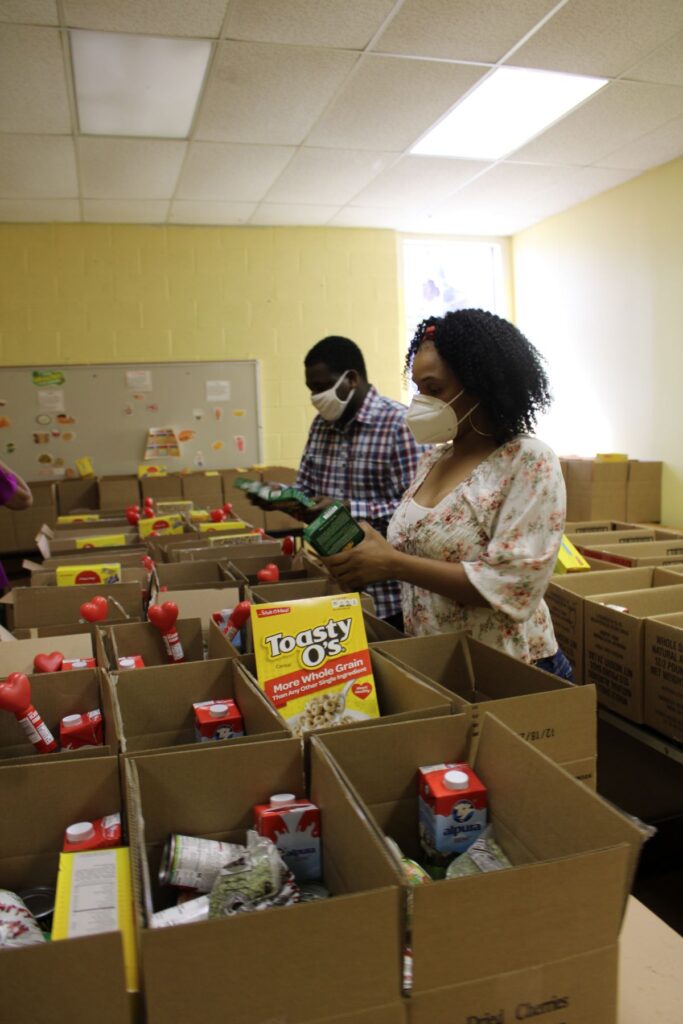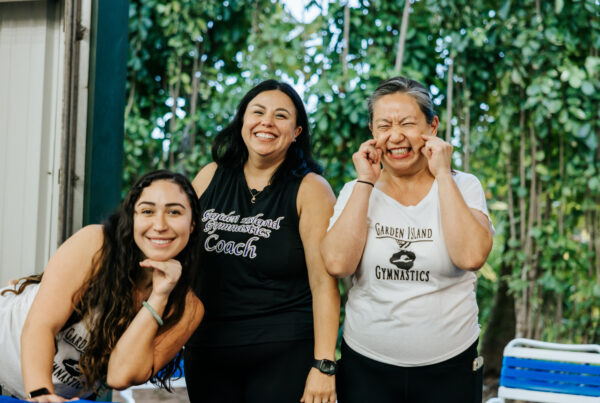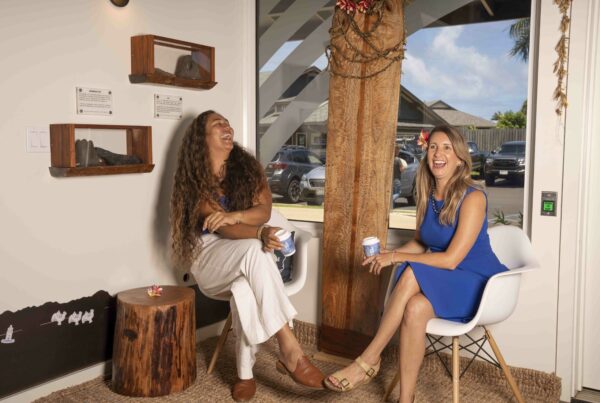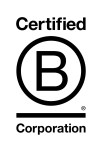Gloria Dickerson wants to change the way people think. It’s no easy task, particularly when it comes to encouraging low-income communities to dream bigger than the world they know. However, Gloria Dickerson is no stranger to adversity.
Gloria was born into an impoverished family of sharecroppers in Drew, Mississippi. She was one of 13 children, and although her family was poor, Gloria says her most valuable assets as a child were her parents. Her mother, Mae Bertha Carter, was active in the Civil Rights Movement and The National Association for the Advancement of Colored People (NAACP). Mae Bertha Carter made clear in action that she wanted better for her children.
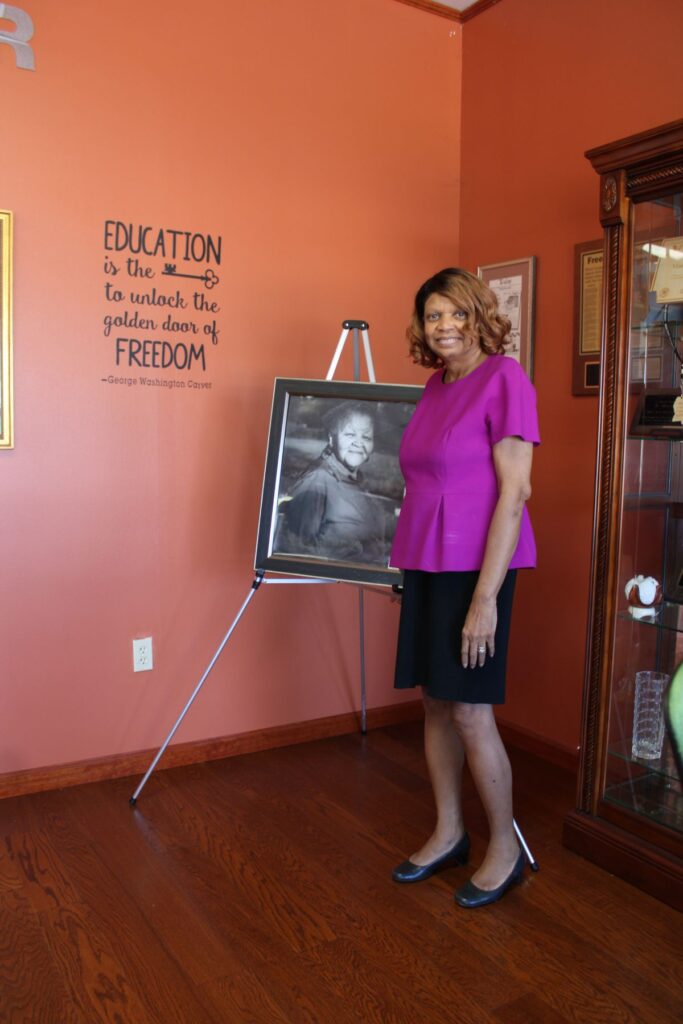
Gloria Dickerson standing next to a photo of her mother, Mae Bertha Carter.
“She didn’t like being a sharecropper, being hungry at night,” Gloria said. “And she didn’t like it when the plantation owner came by and told her that her children couldn’t go to school because they got to get the cotton out of the field. She knew that wasn’t right, and she made it up in her mind that her children were not going to have to live in poverty for the rest of their lives the way she had come up. She didn’t know how, but she was determined.”
In 1964, it became clear what it would take to break Mae Bertha Carter’s family’s cycle of poverty: sending her kids to integrate the Drew School District.
Although Brown v. Board of Education had found segregation of children in public schools unconstitutional in 1954, the Supreme Court decision had largely left it up to states to decide when to integrate their schools. Come 1964, however, states like Mississippi still hadn’t taken any action, prompting the Federal government to threaten to pull federal funding. That’s when the Drew School District adopted what was called Freedom of Choice, which meant that families in the district got to choose where to send their children to school.
In 1965, Mae Bertha Carter chose to send her seven school-aged children to the all-white school, where she knew they’d get a better education. The FBI followed the children to school for the first week, after which they decided the family was safe. That couldn’t have been farther from the truth.
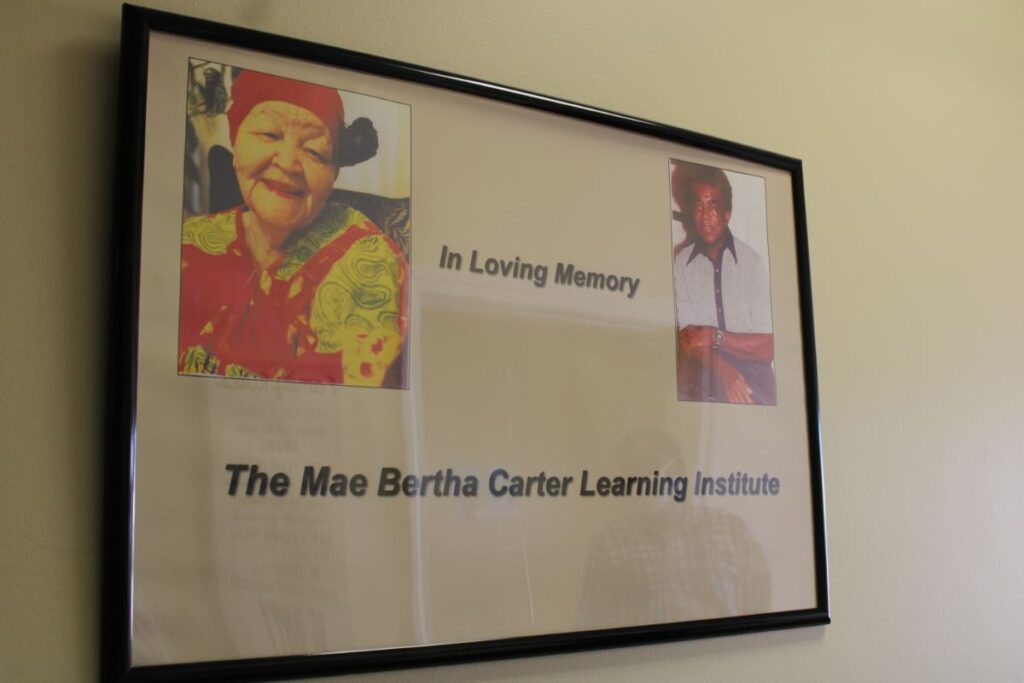 Gloria and her siblings, spread between first grade and eleventh grade, were the only Black students in the school. Their peers threw chalk at them and showered them with spitballs. White students terrorized them in the hallways and called them terrible names, at home things were even worse. People fired guns into the house so that the family had to resort to sleeping on the floor, and people plowed their gardens and released their pigs. The family was even evicted from the plantation where they lived and worked.
Gloria and her siblings, spread between first grade and eleventh grade, were the only Black students in the school. Their peers threw chalk at them and showered them with spitballs. White students terrorized them in the hallways and called them terrible names, at home things were even worse. People fired guns into the house so that the family had to resort to sleeping on the floor, and people plowed their gardens and released their pigs. The family was even evicted from the plantation where they lived and worked.
“My momma used to get on the bed every day,” Gloria said, “and she’d pray when we got on that school bus, and say ‘please Lord, please send my kids home safely.’ Then, at the end of the day when we’d get off the school bus, she’d be there, counting us one by one because she didn’t know if all of us would be coming home or not.”
Gloria says that people did everything they could to try to stop her and her siblings from going to school and to change their minds. In the end, it didn’t work. Instead, the family not only kept sending its kids to the formerly all-white school, but in 1967, it sued the school district on the grounds that it was an intolerable burden on children to have to go through what Gloria and her siblings had to go through to get an education. Gloria’s family won the lawsuit, and the Drew School District threw out Freedom of Choice and school-based segregation in 1969.
When asked, Gloria refers to her time in the all-white high school as both the best and the worst of times. Amidst the external struggles and the social upheaval taking place around her, she learned how to be in solitude and in silence, and she picked up important study skills. She got her education, and one by one, Gloria and her siblings received NAACP scholarships to attend the University of Mississippi, better known as Ole Miss. Each of them later walked across the graduation stage, diploma in hand.
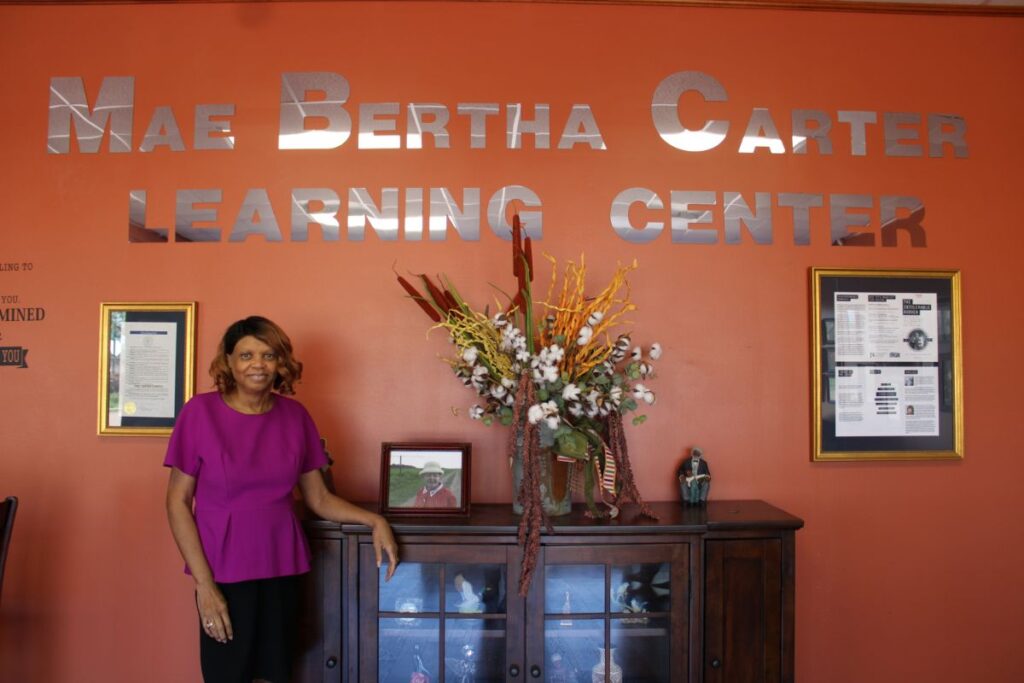
Gloria passed the Certified Public Accountant (CPA) exam and later returned to school to get her M.B.A. On paper, she’d done it — she’d succeeded in accomplishing something and pulling herself up to the middle class. In 1999, she got a job as a corporate controller with Kellogg Foundation. Five years, later, however, she was ready to get out of the back office and back into the community. The foundation sent her to Jackson, Mississippi to be a program officer, where she coordinated capacity-building efforts with community-based organizations across the Mississippi Delta.
That all came to an abrupt end, however, when the Mid-South Delta division of the foundation she worked under was dissolved in 2009. Gloria was forced into an early retirement, which raised some big questions for her. She knew she wanted to be in the field, working with people and giving back to her community. She also knew that every time she visited her mother in Drew, most of the people she saw continued to live in the same poverty that she’d escaped.
“I’d go visit my hometown and say ‘they shouldn’t have to live like this,’” Gloria said, referring to the dilapidated houses, the lack of grocery stores and fresh produce, and the dismal state of the public schools. “We fought so hard in that classroom, but I looked back and said ‘what good did that do?’ It did me some good and it did my family some good, but the job is not over.”
Gloria started a nonprofit called We2Gether Creating Change and decided to return to her community in Drew so that she could show people how to escape poverty and teach them how to thrive.
Table of Contents
Leading By Example
Gloria had her work cut out for her.
Given her professional background, she knew that foundations were somewhat disillusioned with the Mississippi Delta, because no matter how much money they poured into the region, nothing seemed to change.
“When I’d ask them why do you think things aren’t changing, they’d say ‘those people down there need to start thinking differently about their life situation,’” Gloria said. “So, when I started my organization, I wanted to address what those foundations said was the issue: the way people think, and their mindsets, value systems, hopes, dreams, and imaginations.”
Upon returning to Drew, the first thing Gloria wanted to do was to teach school children about their local history. Gloria wanted to teach the kids about the community they’d been born into, and she wanted to share with them how her family was able to use education to lift itself out of poverty. Those history lessons quickly morphed into conversations about self-worth, self-esteem, leadership, life skills, career tracks, etiquette, relationships, and abuse.
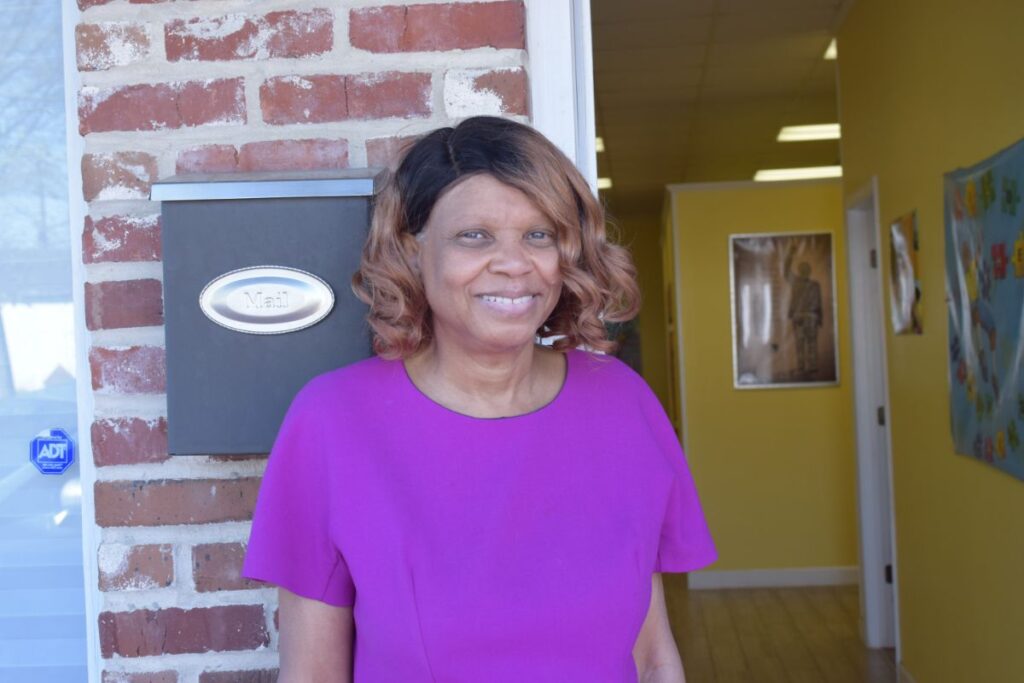
It didn’t take Gloria long to learn that most of her students had never been outside of Drew. That proved problematic, because when she asked them to dream, they had no idea what she was talking about. Therefore, once a year, she started taking groups to Orlando, Florida: to show the kids what middle-class life looked like. They’d go to Universal Studios and to Disney World so that the students could start to imagine a different future for themselves. For eight consecutive years, until the COVID-19 pandemic, Gloria and her team took 100 kids per year to Florida.
“A lot of those kids have gone to college, and some of them have gone back to Disney World with their own kids and families on their own,” Gloria said. “Some are nurses and biologists, and a lot of them tell me ‘if you hadn’t shown me what we could do, I never would have been where I am.’”
Over the years, Gloria’s work with middle and high school students in her community expanded across her community. She began to work with elementary-aged students to help improve their reading levels and she started to work directly with her students’ parents and other adults in Drew, so that they too could begin to change their mindsets. The classes she coordinates range from financial literacy to mindfulness and meditation. However, Gloria knew that if she was truly going to help her community move from poverty to prosperity and from hopelessness to hope, then she was going to also have to find ways to make tangible, physical improvements to Drew to show people that change is possible.
You Have to Give Them Hope
That’s when Gloria called HOPE, a credit union that has generated more than $2.5 billion in financing to benefit more than 1.5 million people across Alabama, Arkansas, Louisiana, Mississippi, and Tennessee. CNote partners with credit unions like HOPE across the country, working together to mitigate the extent to which factors like race, gender, and birthplace limit one’s ability to accumulate wealth. Together, HOPE was able to help Gloria and other concerned citizens in Drew make improvements to their community.
“We didn’t have any playgrounds,” Gloria said, “and the grocery store had closed, so we had no way to get a banana. We didn’t have any affordable houses, and the neighborhood and streets looked like a mess with these dilapidated houses. All of this stuff affects the way people think: it’s their environment. But just because they’re poor doesn’t mean they don’t want to have a place to play or sidewalks.”
The first thing HOPE did was help Gloria and her new group, the Drew Collaborative, to finalize a strategic plan that they could then use to present and send to funders. More so, HOPE funneled grant dollars into Drew, which went toward tearing down decrepit houses and building affordable homes in their place.
HOPE also brought in KABOOM! to build a playground, and the collaborative is currently working to open both a grocery delivery distribution center and a telemedicine center in Drew.
In the wake of the COVID-19 outbreak, HOPE also provided Gloria with a Paycheck Protection Program (PPP) loan to keep her two staff members at We2Gether Creating Change employed. The nonprofit has shifted away from in-person classes and gatherings, and because most people in her community don’t have computers or the internet, going online isn’t possible. Still, Gloria and her team have been distributing disinfectant, masks, gloves, and soap around the community, and because of the PPP loan, they’ve been able to keep their food pantry open.
“If it wasn’t for HOPE, I would have had to lay off my employees,” Gloria said. “I’m glad I was able to keep them, and I’m grateful that we were able to get that funding, because we wouldn’t have been able to continue with things unless I was able to keep those two on.”
Dreaming Beyond The Pandemic
Whereas the coronavirus pandemic has turned much of her world on its head, if there’s one thing that Gloria is grateful for over these past few months, it’s the time she’s been given to step back and to think about the future of We2Gether Creating Change and of Drew, Mississippi. According to her, she wants her nonprofit to get more into racial equity work. That includes acquiring the barn where Emmett Till was killed and turning it into a museum or a retreat center — a place in the community that pays tribute to him. She’d also like to restore a small jail in Drew that was used to imprison some of the Freedom Riders back in the 1960s. It all ties back to the initial work that Gloria started in the community when she moved home in 2009: teaching people about their local history so that they can use education as a vehicle to escape poverty.
As for Drew, Gloria wants to leverage her position as a Sunflower County district supervisor to improve the town’s infrastructure and aesthetics. It’s a difficult task, but still, it’s something that Gloria is committed to.
“I need to do this,” she said. “I need to work in this community and try to help people and serve people. I’m passionate about it because I know what it was like for me trying to grow up in poverty and how hard and painful it was. Even if I can help anybody else to not have to go through that, then that’s what I want to do. That’s what drives me.”
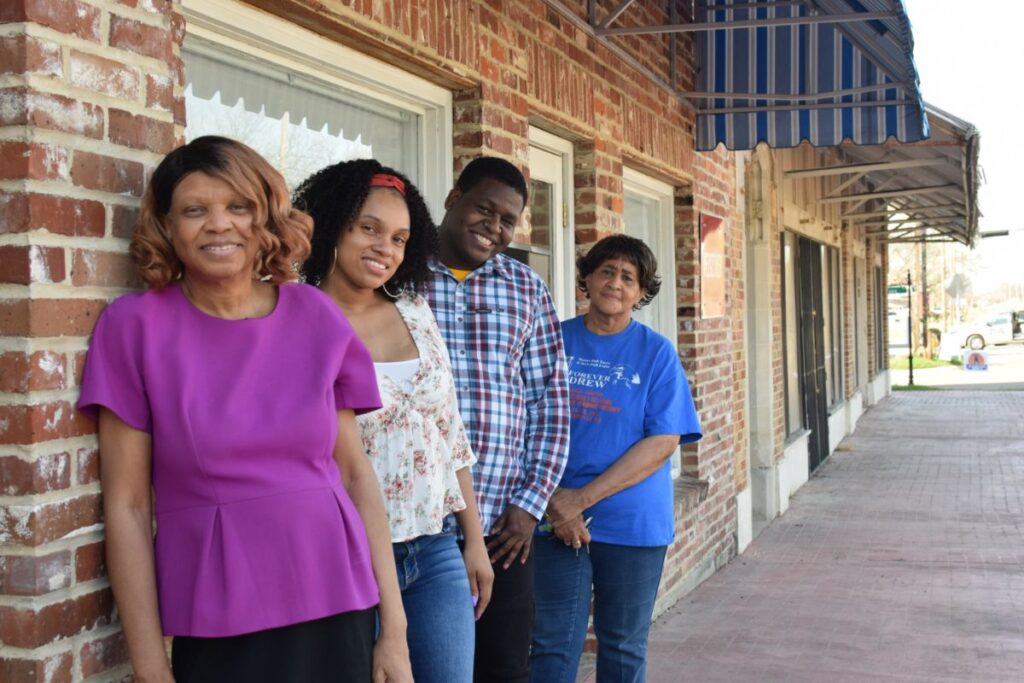
Gloria and the We2Gether Creating Change Team
It’s that same drive that led Gloria to spend her first eight years with We2Gether Creating Change without paying herself a salary. In fact, she’s poured in well over $500,000 of her own money to fund trips to Disney World, distribute scholarships, provide student stipends, pay course instructors, cover overhead expenses, and much, much more. She’s received some financial support from Kellogg Foundation, her previous employer, and other donors, but given Gloria’s aspirations for her community-based work in Drew, she’s going to need more help from foundations that aren’t afraid to invest in her philosophy.
After all, she doesn’t have to look far to see that her approach works. It’s evident when Gloria returns to Ole Miss for graduation ceremonies to watch her students walk across the stage and receive their degrees, just like it’s visible during her trips to Disney World, when she sees kids laughing and playing and having a good time in a place far, far away from the poverty of Drew.
“To see them there with that smile on their face,” she said, “that is what being out of poverty means. That’s really joyful for me, when I see people benefiting from things we’ve done and accomplishing things on their own. I’m so proud when I see people progress, and when I see that they’re gonna make it on their own.”
Learn More
- We2Gether Creating Change
- HOPE Credit Union provides financial services; aggregates resources; and engages in advocacy to mitigate the extent to which factors such as race, gender, birthplace and wealth limit one’s ability to prosper. Since 1994, HOPE has generated more than $2.9 billion in financing that has benefitted more than 1.7 million people in Alabama, Arkansas, Louisiana, Mississippi, and Tennessee.
- CNote – Interested in helping create another story like this? CNote makes it easy to invest in great Credit Unions like HOPE, helping you earn more while having a positive impact on businesses and communities across America.

